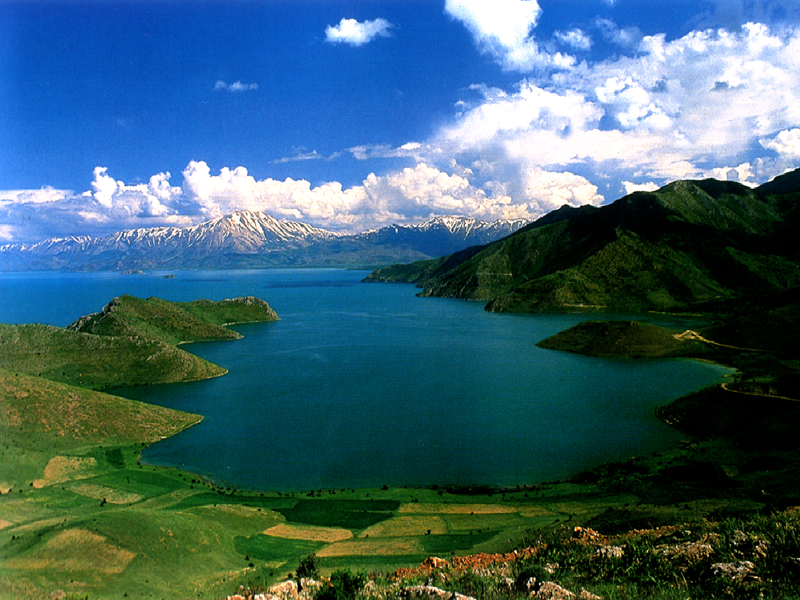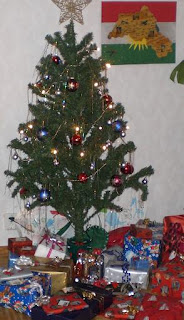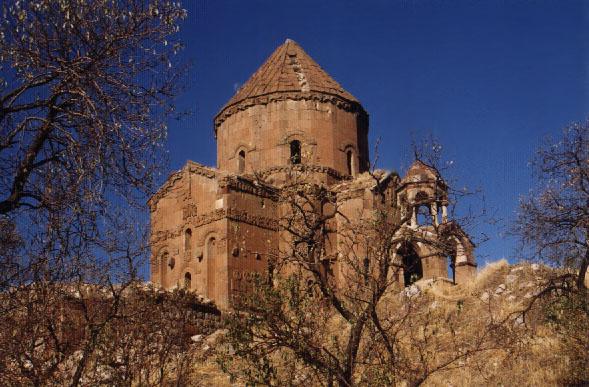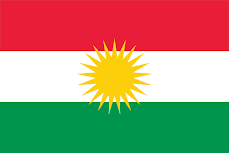
This website will report about Christianity and Christians in Kurdistan but also about Christ and the Lord in general. Amîn
Sunday, February 24, 2008
Saturday, February 23, 2008
Mêwa Rastîn
 Mêwa Rastîn
Mêwa Rastîn 15 1 «Ez mêwa rastîn im, Bavê min jî rezvan e. 2 Ew her şivika min a ku fêkî nade dibire; her şivika ku fêkî dide jî, ji bo ku bêtir fêkî bide dikezixîne û paqij dike. 3 Bi gotina ku min ji we re got, ji xwe hûn paqij in. 4 Bi min re bimînin, ez jî bi we re. Çawa ku şivik bi mêwê ve nemîne ji ber xwe nikare fêkî bide, hûn jî wusa bi min re nemînin hûn nikarin fêkî bidin.
5 «Ez mêw im, hûn jî şivik in. Yê ku bi min re dimîne û ez bi wî re dimînim, ew gelek fêkî dide. Çimkî bêyî min hûn nikarin tu tiştî bikin. 6 Eger yek bi min re nemîne, wê wek şivika mêwê bê avêtin derve û hişk bibe. Hingê ew tên civandin, tên avêtin nav êgir û dişewitin. 7 Eger hûn bi min re bimînin û gotinên min di dilê we de bimînin, hûn her çi dixwazin bixwazin, wê ji we re bê dayîn. 8 Bavê min bi vê yekê, bi zêde fêkî dayîna we bi rûmet dibe û bi vî awayî hûnê bibin şagirtên min.
 9 «Wek ku Bav ji min hez dike, ez jî wusa ji we hez dikim. Di hezkirina min de bimînin. 10 Eger hûn emrên min bînin cih, hûnê di hezkirina min de bimînin; çawa ku min emrên Bav anîn cih û ez di hezkirina wî de dimînim. 11 Min ev tişt ji we re gotin, da ku şabûna min bi we re be û şabûna we temam bibe. 12 Emrê min ev e: Ji hevdû hez bikin, wek ku min ji we hez kir. 13 Tu hezkirin ne di ser wê hezkirinê re ye ku mirovek di ber dostên xwe de canê xwe bide. 14 Eger hûn tiştên ku min li we emir kirin bînin cih, hûn dostên min in. 15 Êdî ez ji we re nabêjim ‹xulam›; çimkî xulam nizane ku axayê wî çi dike. Ez ji we re dibêjim ‹dostên min›; çimkî her tiştên ku min ji Bavê xwe bihîstin, min bi we dan zanîn. 16 Ne we ez hilbijartim, lê min hûn hilbijartin û kifş kirin, da ku hûn herin fêkî bidin û fêkiyê we bimîne. Hingê hûn bi navê min çi ji Bav bixwazin ewê bide we. 17 Emrê min ji bo we ev e: Ji hevdû hez bikin.
9 «Wek ku Bav ji min hez dike, ez jî wusa ji we hez dikim. Di hezkirina min de bimînin. 10 Eger hûn emrên min bînin cih, hûnê di hezkirina min de bimînin; çawa ku min emrên Bav anîn cih û ez di hezkirina wî de dimînim. 11 Min ev tişt ji we re gotin, da ku şabûna min bi we re be û şabûna we temam bibe. 12 Emrê min ev e: Ji hevdû hez bikin, wek ku min ji we hez kir. 13 Tu hezkirin ne di ser wê hezkirinê re ye ku mirovek di ber dostên xwe de canê xwe bide. 14 Eger hûn tiştên ku min li we emir kirin bînin cih, hûn dostên min in. 15 Êdî ez ji we re nabêjim ‹xulam›; çimkî xulam nizane ku axayê wî çi dike. Ez ji we re dibêjim ‹dostên min›; çimkî her tiştên ku min ji Bavê xwe bihîstin, min bi we dan zanîn. 16 Ne we ez hilbijartim, lê min hûn hilbijartin û kifş kirin, da ku hûn herin fêkî bidin û fêkiyê we bimîne. Hingê hûn bi navê min çi ji Bav bixwazin ewê bide we. 17 Emrê min ji bo we ev e: Ji hevdû hez bikin.
Choir of Mor Yacoub of Nisibin (Northern Kurdistan) – Sweden
 Click and listen (*.RAM files)
Click and listen (*.RAM files)(Church Hymn)
Lyrics: Melphono Naoum Fayiq
Music:
(Church Hymn)
Lyrics:
Music:
Listen to All the Songs
Churches and monasteries in Kurdistan
 Dayro D'Kurkme (Dair Al-Za'faran) monastery in Mardin - northern Kurdistan
Dayro D'Kurkme (Dair Al-Za'faran) monastery in Mardin - northern Kurdistan(from bethsuryoyo.com)

The bell tower of Mor Yacoub (St. Jacob) church in Qamishly, west Kurdistan.
(from bethsuryoyo.com)

The altar of the Dayro D'Kurkme (Deir Al-Za'faran) monastery in Mardin, northern Kurdistan.
(from bethsuryoyo.com)

The Syriac Orthodox Church Choir in Qamishly, west Kurdistan.
(from bethsuryoyo.com)

The Syriac Orthodox Church of the Virgin Mary in Qamishly, west Kurdistan.
(from bethsuryoyo.com)
Cristiani Del Kurdistan

| Kurdish Library House - SARA | ||
| Title | Cristiani Del Kurdistan | |
| Author | Galletti, Mirella | |
| Info | Assiri, Caldei, Siro-Cattolici e Siro-Ortodossi | |
| Price | 48 EUR | BUY! |
Avaible at Sara Disbribution
Wednesday, February 13, 2008
Sarkis Aghajan Mamendu

Sarkis Aghajan Mamendu was appointed the Kurdistan Regional Government’s (KRG’s) Minister for Finance and the Economy in May 2006.
He had previously held the post of Finance Minister and Deputy Prime Minister in the Erbil and Dohuk administration of the KRG.
Mr. Aghajan, born in 1962 in Diyana, Erbil Province, is an Assyrian and a leading member of the Iraqi Christian community. The Assyrian people in the Kurdistan Region and other parts of Iraq are believed to have descended from the ancient Assyrians of Mesopotamia, who ruled over a vast empire across the Middle East.
Mr. Aghajan is known throughout the Kurdistan Region and in Iraq for his commitment to the ancient Assyrian community, through his efforts to rebuild villages and churches destroyed by the previous Iraqi regime and to promote and protect Christian rights.
In 2006, Pope Benedict XVI awarded Mr. Aghajan the Knight Commander of the Order of Saint Gregory the Great for his work with the Assyrian Christian community in Iraq.
Mr. Aghajan sees foreign direct investment and the development of a banking and insurance system as key to the continuing growth and expansion of the Kurdistan Region’s economy. He sits on the KRG’s supreme council for strategic economic development, which is headed by the Prime Minister.
Tuesday, February 12, 2008
Monday, February 11, 2008
Movie about a Kurdish Christian
The movie is in Turkish but with English subtitles
Sunday, February 10, 2008
Church on Kurdish island
Garden of Eden in Kurdistan

According to the Old Testament the Kurdish Wan Lake is The lake in the Garden of Eden
(from saradistribution.com)
"I am the ligth in this world" - Îsa Mesî

Yûhenna 8:12
Ronahiya Dinyayê
12 Îsa dîsa bi wan re peyivî û got: «Ez ronahiya dinyayê me; yê ku li pey min bê, tu caran di tariyê de rêve naçe, lê wê bibe xweyî ronahiya jiyanê.» 13 Fêrisiyan lê vegerand û gotin: «Tu şahidiya xwe dikî; şahidiya te ne rast e.» 14 Îsa bersîv da û ji wan re got: «Eger ez bi xwe şahidiya xwe bikim jî, şahidiya min rast e; çimkî ez dizanim ku ez ji ku derê hatim û diçim ku derê. Lê hûn nizanin ku ez ji ku derê têm an diçim ku derê. 15 Hûn li gor ku çav dibîne dadbar dikin, lê ez tu kesî dadbar nakim. 16 Lê eger ez dadbar bikim jî, dadbarkirina min rast e; çimkî ez ne bi tenê me, ez û Bavê ku ez şandime em bi hev re ne. 17 Di Şerîeta we de jî hatiye nivîsîn ku şahidiya du kesan rast e. 18 Ez şahidiya xwe dikim û Bavê ku ez şandime jî şahidiya min dike.»
19 Li ser vê yekê wan jê pirsî: «Bavê te li ku derê ye?» Îsa bersîva wan da: «Hûn ne min nas dikin ne jî Bavê min. Eger we ez nas bikirama, weyê Bavê min jî nas bikira.» 20 Îsa ev peyvên ha, çaxê li Perestgehê hîn dikir, li cihê ku lê pere dicivandin gotin, lê kesî ew negirt, çimkî hê saeta wî nehatibû.
Al-Qaeda Threat to Kurdish Converts
Posted GMT 6-5-2007
Al-Qaeda has issued a death threat to Christian converts in Kurdistan the UN's Office for the Coordination of Humanitarian Affairs reports.
"We are hunting those who have converted to Christianity or Zoroastrianism as we consider them renegades and God's punishment must be implemented by killing them," the Islamist terrorist group said in a statement released on the internet on April 22.
Al-Qaeda urged Kurds to join the "Mujahedin and hoist the jihad flag against the crusaders who are occupying Iraq, instead of supporting them."
"We are not afraid of them; in fact, they are welcome if they want to kill us," Sabeer Ahmed told the UN's IRIN news agency. A member of the evangelical Christ Church in Pishdar in the Sulaimaniyah Province, Ahmed converted to Christianity seven months ago. "We will be happy to be martyrs when we sacrifice ourselves for our religion," he said.
The leader of Iraq's Roman Catholics, the Patriarch for the Chaldeans Emmanuel III Delly earlier this month protested the attacks upon Christians in the country. In a statement released on the Patriarchate's website, Emmanuel stated "Christians are killed, chased out of their homes before the very eyes of those who are supposed to be responsible for their safety."
"Today, Christians are persecuted in a country where everyone is fighting for their own personal interests," he said on May 6.
Muslim elders in the northern Iraqi town of Sulaimaniyah told IRIN they believed the conversions to Christianity by Kurdish young people were economically motivated.
Christian missionaries had been "exploiting the harsh economic situation" in the region Sheikh Hassan Abdullah, a tribal elder told IRIN. Becoming a Christian was seen as a ticket out of Iraq for unemployed Kurds, who if they converted "can say that they are threatened and need a safe haven," Abdullah said.
However a Roman Catholic priest in Sulaimaniyah told IRIN financial gain does not motivate a Muslim to accept Christianity. "Those youths reached their decision after having become fully convinced about what Christianity teaches. They believe in Christ and nothing else and we're sure of that," the priest said.
In the past year approximately 500 Muslim Kurds had converted to Christianity, said Ahmed. The threats from Al Qaeda will not deter Christian evangelism he said.
By George Conger
www.religiousintelligence.co.uk
Kurdish Converts to Christianity Ostracised By Society and Family

North Iraq -- The small but growing number of Kurds who convert to Christianity say they face discrimination and intolerance from the Muslim majority. Kurdish Christians -- still a tiny minority - say they find it difficult to practice their religion because of public intolerance. Muslims in the region counter that it is wrong for Christians to proselytise among other faith groups. The converts are joining new, western-style Christian groups which started growing after the fall of Saddam Hussein, rather than the long-established Christian communities such as the Assyrians and Chaldeans, who do not seek new members from Muslim backgrounds.
Majid Rashid Muhammed, a member of the Kurdish Christian Church Committee, said his church has gained at least 200 members in the last few months, bringing its congregation to more than 700.
"The rate at which people are joining our church is continually increasing, and most of them are young people," he said.
Many Muslims object to the new churches seeking to win over converts from the Islamic faith. Those who make the decision to become Christian may be shunned -- even by relatives.
A 20-year-old man, who spoke on condition of anonymity, said no one in his family knew that he had turned to Christianity. "I'll try to keep it a secret because our community is a Muslim one," he added.
Abdul-Rahman has also got into trouble for preaching his religion to other Kurds. He said he's been arrested so often for carrying a Bible "that I've got used to it".
On a proselytising mission in the mountainous area of Qandeel, he was recognised as a Christian convert by a driver. "He started to insult me," said Abdul-Rahman. "He spat on me, beat me with his pistol and punched me in the mouth."
The Kurdistan Islamic League has issued a statement addressed to Christian groups and churches saying it is a "strange and terrible act" and an "unhealthy phenomenon" for a Muslim to convert.
"This phenomenon will eventually lead to a feud in Kurdistan," said Osman Ali, a member of the Islamic league's Sulaimaniyah branch.
The region's religious affairs minister, Muhammed Ahmed Gaznayi, said people who turn to Christianity are "renegades" in the eyes of Islam.
"I consider that those who turn to Christianity pose a threat to society," he added.
The Christian community also has to worry about its collective security, as churches have been targeted by insurgents.
By Ayyub Kareem
Christmas in Kurdistan
I share here a letter from one of our local Catholic Workers who is on a peacekeeping mission in Kurdistan. This first-hand experience is very valuable for us as we pray for the peace of the world to come to every corner of the world this Christmas and as we enter a new year which will include an election of such impact to the world.
Hi all,
First, I want to wish you all a Merry Christmas-Happy Holiday from Kurdistan.
Last week was the Muslim holiday Eid. Pretty much everything came to a standstill. Shops were closed (except for food). Internet cafes were either closed or overloaded so getting emails out was really difficult.
The day before Eid started, Peggy and I went to the market to look for a manger scene. We managed to find a dusty dirty baby Jesus in a thrift store. He was shoved in between used candles, dirty plates, and broken figurines. We also found 2 pink sheep (they are really little candles) and a figurine that with a great deal of imagination can pass as a shepherd. Oh, I forgot about the 3 Wise Guys. They were made out of pine cones.
A while ago, our team coordinator sent us a box of books through FedEx. The box made the perfect manger and the symbolism became more and more ironic; Jesus found in a used-a-bit store, born into the world in a cardboard box. The other day we picked up some dried grass where we went hiking in the mountains along the Iranian border. We thatched the roof of the manger and used the rest for bedding on the floor.
We searched high and low for the lost parents of baby Jesus and couldn't find them anywhere. Asking for Mary and Joseph in English in a primarily Muslim culture can be a bit frustrating for both parties. So I held up the baby Jesus we found and in my best Kurdish asked - dieekay oow bowtikay laquaya ( that would be where is his mother and father)? This caused a great amount of attention and a crowd of people gathered to explain that this was Eid and Christmas would come in 4 YEARS. We quickly got it straightened out that Christmas was actually coming in 4 days. In any case, there was lots of laughter and handshakes and welcoming gestures from the Kurds to us and someone managed to say Merry Christmas in as broken and strained English as my saying Jeshnit Pirroze (Happy Eid) was in broken and strained Kurdish. Later that evening, Mary, Joseph and a camel were made out of cardboard cut-outs, proportionatly correct in size to baby Jesus, of course. We are missing the donkey and maybe a cow.
Next came the Christmas tree. We were able to get a potted spruce tree about 2 feet tall which we decorated with peace cranes that we made and decorations that a friend gave us. After Epiphany, we plan to plant it in the mountains where Saddam had taken out all the trees. The Kurds are in the midst of a major reforestation project so our tree planting will be a small gift to their project.
Tomorrow Peggy and I plan to go to the Chaldean Church for Christmas Mass while Anita and Cliff visit a military base to find out about Iraqi prisoners.
The bombing by the Turks against the PKK is really taking its toll on the villages and people along the border inside Kurdistan. The people of Kurdistan are damn mad at the US. The US admittedly gave "military intellegence information" to the Turks and then turned their heads when the Turks attacked inside the Kurdish region. The US is also responsible for the protection of Kurdish air space yet Turkish jets fly inside the Kurdish region regularly.
We recently learned that 359 Kurdish families along the border have been displaced. There are about 6 members per family so you can do the math to get the total number of people. 2 people were killed and 5 wounded. 2 schools, 1 hospital and 1 Mosque were destroyed. 300 sheep were killed or dispersed. The Turks continue to send in surveillance planes and another air attack occurred yesterday. We also learned that several months ago, there was an attack inside the Kurdish region but in an area that was known to be void of PKK. 60 families were displaced in that attack.
Everyone we speak to about this situation tells us that it has absolutely nothing to do with the PKK. It's a dirty game that Turkey is playing in order to get Kirkuk and the US doesn't know who to side with and still maintain control over "US interests." Meanwhile, the people suffer and this very tenuous state of stability in Northern Iraq is gravely threatened.
Recently, we spoke with a Kurdish human rights worker who met with a US Congressman last summer about the Kurdish-Turkish situation. He said he was shocked at the both the arrogance and ignorance of this US representative. He would not give us the name of the Congressman.
Yesterday, we spent the day with 2 families who survived the gassing of the town of Halubja during Saddams Anfal campaign against the Kurds. Their stories were tragic beyond words. One person was most willing to relive his nightmare only if he could believe that in telling his story, the world might learn so that it never happen again. His toddler-aged grandson was in the room with us and it was clear that what little hope in life this man had resided in this little boy and his future.
He started his story with an expression of strong disappointment and dismay at the US actions regarding Turkey. He felt betrayed and angry that the US would once again, turn its back on the Kurds. He pleaded with us for the US to intervene; not with war but with strong diplomacy. It seems that in order for diplomacy to be effective, the US might have to take its eyes off the oil long enough to become educated about the complex relationships and history the people in this part of the world share. Clearly the Congressperson our human rights friend spoke with would not be a good diplomatic representative.
Our Halubja friend was very quick to not let the US PEOPLE off the responsibility hook. He was very well informed about the influence US people had over the government during the Vietnam War and he was also well versed in the US civil rights struggle.
We are getting closer to launching a reconciliation program in conjunction with a number of local NGO's. We've been advised that the most effective way to do this would be through the people of Kirkuk. Kirkuk has been described as a microcosm of Iraq. If reconciliation and nonviolence can flourish in Kirkuk, the country of Iraq in general has a chance.
We continue to follow, advocate for and accompany the independent journalists in Kurdistan. We learned that another journalist will go to trial for something he wrote about the Peshmerga. He was actually supposed to go to court months ago but he was kidnapped, beaten and his life was threatened because of what he wrote and had to be hospitalized. He was recently informed that the charges against him will proceed and he expects a court hearing in early January. Meanwhile, there are plans afoot to gather a number of people together to attend his trial as court support. CPT plans to be there.
Well, that's it for now.
Peace, Michele Naar-Obed
Bishop of Kurdistan: “the Church in Iraq is in great danger”

04/24/2007
Erbil (AsiaNews) – There are numerous children and Dominican nuns among the wounded from yesterday’s suicide bombing of the Christian village of Tell-el-skop, north east of Mosul. Suicide attacks targeting the North of the country have sounded the alarm for religious leaders, who now ask the Holy See for help. “Find a way, a means to save us, the Church in all of Iraq is in great danger, we beg the Vatican to help us bring our voice to the world”. It almost seems like an ultimatum, these words expressed by Msgr. Rabban al Qas, Chaldean bishop of Amadiyah and Erbil, in his reiteration of the Iraqi Catholic Churches appeal launched yesterday through AsiaNews l’appello, following the increasingly ferocious nature of attacks carried out against Christians in the country.
The bishop speaks from Kurdistan, upon till now an oasis of calm where Iraq’s Christians could find refuge. He speaks of the “frightening situation” for the community in big cities and in the small villages. Yesterday’s attack on Tell-el-skop, where a car bomb was exploded closet o the head quarters of the Kurdistan Democratic Party, the Kurdish political party lead by Massoud Balzani, was not the first such attack. The explosion seriously damaged the nearby Dominican Convent and primary school and kindergarten which the sisters run. At least 10 people were killed among them two children; among the 140 wounded there are two religious. A sister present at the time of the blast said the explosion terrorized the little ones, who up on till now had never witnessed such violence in their village.
According to local catholic sources the spreading attacks on the north have confessional origins: “they want to attack Christians and religious minorities to prove that there is neither security plan, nor protection barrier that the USA can build capable of protecting them”. Political-economic motivations are neither excluded: “We will target Kurds along with Christians, whose demands on Kirkuk’s oil reserves are intolerable to many groups both in Iraq and abroad” add the sources.
Either ways the areas suffering the most at the moment remain Baghdad and Mosul. Church sources in Baghdad confirm that the “massacre” in the Dora quarter, where armed Sunni groups kill Shiites and impose conversion or exile on the Christians, continues unabated. Even Christians hopeful of a free and peaceful Iraq now speak of “a country without hope, for at least a further ten years”.
















